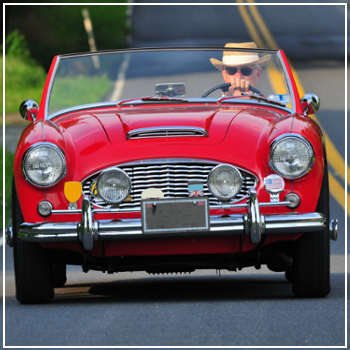 After you've done your research and found the sports car that catches your eye, it's important to take a step back before making a big financial commitment. While these cars offer style, performance, and excitement, they also come with unique challenges in terms of maintenance, repair, and safety. Here are some key factors to consider before you drive off in your dream ride.
After you've done your research and found the sports car that catches your eye, it's important to take a step back before making a big financial commitment. While these cars offer style, performance, and excitement, they also come with unique challenges in terms of maintenance, repair, and safety. Here are some key factors to consider before you drive off in your dream ride.
1. Finding Replacement Parts
If you're considering a classic or vintage sports car, one of the first hurdles you might face is finding replacement parts. Unlike modern vehicles, many older models don't have readily available components at local auto shops. You may need to order parts from specialty suppliers, join a classic car club, or even attend auctions to locate rare or specific components. Additionally, if you plan to use the car for daily commuting, you may need to retrofit it with modern features like airbags, seatbelts, and updated electrical systems to meet current safety standards.
2. Safety Features May Be Limited
While sports cars often come equipped with advanced active safety technologies—like lane-keeping assist and adaptive cruise control—they can sometimes lack essential passive safety features. For example, many sports cars feature bucket seats that don’t adjust easily, which can reduce comfort and increase the risk of injury in a crash. Adjustable head restraints, which help prevent whiplash, are often missing in traditional sports car designs. This means drivers should be aware of potential limitations when choosing a high-performance vehicle.
3. Design Can Affect Safety
Sports cars are typically smaller, lighter, and built for speed rather than practicality. This design can lead to several safety concerns:
- Reduced rear visibility due to small windows and limited mirrors.
- Larger blind spots, especially on the sides and rear.
- Lower ground clearance increases the risk of damage in collisions with larger vehicles like SUVs or trucks.
- Lighter weight means more vulnerability in crashes, leading to greater structural damage.
- Powerful engines can make handling more difficult in wet or icy conditions, increasing the chance of skidding or losing control.
- Convertibles, in particular, pose higher risks during side-impact collisions due to the absence of a roof and reinforced pillars.
4. Limited Crash Testing Data
Not all sports cars undergo extensive crash testing by organizations like the IIHS or NHTSA. Especially for low-volume or custom models, there may be little to no data on how well the vehicle performs in real-world accidents. This lack of testing can leave buyers unaware of potential safety issues until it’s too late. Always check for available safety ratings and consider consulting with a trusted mechanic or body shop before purchasing.
Whether you’re restoring an old classic or maintaining a newer sports car, it's wise to get a professional inspection. At DaSilva’s Auto Body, we specialize in assessing and repairing high-performance vehicles. Our team uses state-of-the-art equipment to ensure your car is safe, reliable, and ready for the road. Contact us today to schedule a consultation and keep your dream car running smoothly for years to come.
Filter Gluing Injection Machine
Filter Gluing Injection Machine,Gluing Injection Machine,Hot Melt Glue Filter Paper,Filter Glue Machine
ChangZhou FENGJU Machinery Equipment CO., LTD , https://www.fengjumachinery.com